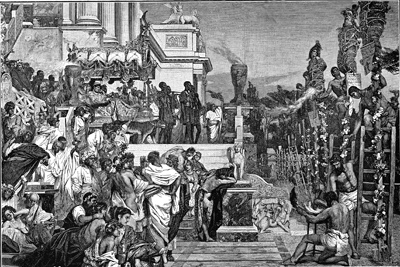37
The birth of the emperor Nero.
How do you rule an empire when you pretend that you’re living in a republic? When Octavius Caesar seized control of the Roman Republic, ruling it from 31 BC to 14 AD, he maintained the fiction that all the old republican institutions still functioned and that he was merely “princeps” or “first citizen”. This lie allowed a strong one-man rule while seeming to be continuing a 500-year old tradition. The fiction was harder to maintain as succeeding members of Caesar’s family proved to be mad, tyrannous or both. Tiberius, who ruled during the public career of Jesus of Nazareth, became paranoid and addicted to fortune tellers. Caligula was convinced he was a living god and Claudius was notoriously dim-witted. The last of this Julio-Claudian dynasty was to be Nero, self-styled poet and murderer of his tutor, step-brother, wives, and mother.
In 64 Nero, wishing to redevelop Rome and build an enormous palace, had fires set which gutted the heart of the city. Rather than accept blame Nero accused others. According to the historian Tacitus:
Consequently, to get rid of the report, Nero fastened the guilt and inflicted the most exquisite tortures on a class hated for their abominations, called Christians by the populace. Christus, from whom the name had its origin, suffered the extreme penalty during the reign of Tiberius at the hands of one of our procurators, Pontius Pilatus, and a most mischievous superstition, thus checked for the moment, again broke out not only in Judæa, the first source of the evil, but even in Rome, where all things hideous and shameful from every part of the world find their centre and become popular. Accordingly, an arrest was first made of all who pleaded guilty; then, upon their information, an immense multitude was convicted, not so much of the crime of firing the city, as of hatred against mankind.
Tacitus in recording Nero’s actions provides a non-Christian testimony to the historicity of the crucifixion and the visible presence of a Christian community in Rome at the time when Peter and Paul were said to have been murdered by state persecution.
